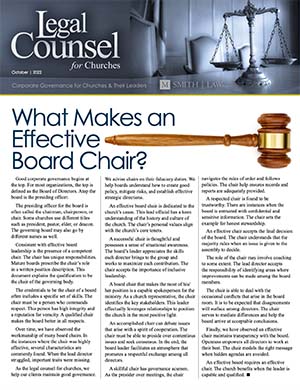All organizations undergo leadership turnover. It is important to ensure that new church directors and leaders are fully equipped to be successful in their roles.
The process of training new leaders is often called orientation. Orientation is a program where new directors, officers and management figures undergo an introduction to their roles in the organization. These leaders must become familiar with the church and their official roles. Here, we will explore some guidelines to help your church onboarding process go smoothly.
The training for directors is somewhat similar to new employees. Leaders should have position descriptions that explains their responsibilities in the ministry. The position description lists the qualifications for the assignment, areas that require focus, and roles the leader is expected to fulfill.
After the new director gets a grasp on his/ her role, the focus should turn to corporate governance. The governance for a church is an important responsibility of a leader. Furthermore, each organization’s governance dictates a code of conduct. The leader must be aware of the terms in the church’s constitution, charter, policies, and bylaws.
After a discussion about corporate governance, this may lead the leader into an exploration of the internal policies the board has previously approved. These policies may include related party transactions, whistle- blower protections, code of ethics, and indemnification agreements.
Church officers must abide by legal responsibilities as well. New directors should understand their fiduciary duties to be loyal to the church, avoid conflicts of interest, and act reasonably. It could be helpful to invite the church’s attorney to help inform the directors on these matters.
Church leaders should be expected to be financially literate on the fiscal affairs of the ministry. This includes having the ability to read the financial statements, understand trends and grasp how the operations affect the church’s economic interests.
An organization’s leadership should not just be focused on the present. Leaders are expected to think about the future and help develop strategic plans to meet the church’s ambitions. New directors should be given a copy of the strategic plan and business forecasts. This will help a church leader know the vision and direction of the ministry.
New directors may benefit from having a mentor during the first year to help guide the director’s development. The mentor can be available to answer questions and offer one- on-one insight. This support can help a new director advance through the learning curve faster.
MATERIALS FOR ORIENTATION TRAINING PROGRAM
Here are some resources that may be provided to new directors during an orientation training.
- Audited Financial Statements
- Copy of Current Budget
- Recent Bylaws
- IRS 990 Filings
- Roster of all Officers and Directors
- List of all Church Management Officials
- Last Two Board Self-Evaluations
- Summary of Significant Litigations
- Disclosure of Government Investigations
- Press Releases for Last Two Years
- Minutes from Recent Board Meetings
- Copy of Directors’ Liability Insurance
- Copy of Fidelity Bond Policy
- Most recent Strategic Business Plan
- Conflict of Interest Rules
- Calendar of Meetings and Events

